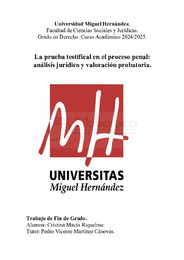Please use this identifier to cite or link to this item:
https://hdl.handle.net/11000/36982Full metadata record
| DC Field | Value | Language |
|---|---|---|
| dc.contributor.advisor | Martínez Cánovas, Pedro Vicente | - |
| dc.contributor.author | Macía Riquelme, Cristina | - |
| dc.contributor.other | Departamentos de la UMH::Ciencia Jurídica | es_ES |
| dc.date.accessioned | 2025-07-28T11:24:47Z | - |
| dc.date.available | 2025-07-28T11:24:47Z | - |
| dc.date.created | 2025 | - |
| dc.identifier.uri | https://hdl.handle.net/11000/36982 | - |
| dc.description.abstract | La prueba testifical ha constituido uno de los medios probatorios más utilizados y, al mismo tiempo, más controvertidos del proceso penal. Su valoración judicial ha planteado numerosos desafíos prácticos y teóricos que nos han llevado a realizar un estudio riguroso desde el punto de vista doctrinal, normativo y jurisprudencial. En este trabajo hemos analizado en profundidad el valor jurídico de la prueba testifical en el proceso penal español, considerando su naturaleza subjetiva, su tratamiento por los tribunales y su función como único medio probatorio en numerosos procedimientos. Partimos de la premisa de que el testimonio humano representa, en muchas ocasiones, la única vía para acreditar hechos delictivos, especialmente en delitos cometidos en la intimidad. En consecuencia, la fiabilidad de esta prueba y su valoración conforme al principio de libre valoración judicial se convierte en un eje esencial. Hemos abordado las garantías procesales que rigen su admisión, así como las exigencias de contradicción, inmediación y publicidad. Estudiamos también los criterios jurisprudenciales del Tribunal Supremo y el TEDH, como la credibilidad subjetiva, la persistencia en la incriminación o la verosimilitud del relato, así como los mecanismos para introducir testimonios anticipados en casos de especial vulnerabilidad. La metodología empleada ha combinado el análisis normativo (Ley de Enjuiciamiento Criminal y Constitución Española) con doctrina especializada y jurisprudencia clave, incluyendo la STS 398/2020 y el caso Doorson v. The Netherlands (1996). Finalmente, comparamos distintos sistemas procesales y proponemos medidas de mejora probatoria y procesal, con el objetivo de contribuir a un proceso más justo, equilibrado y respetuoso con los derechos fundamentales. | es_ES |
| dc.description.abstract | Testimonial evidence has been one of the most widely used and, at the same time, most controversial means of proof in criminal proceedings. Its judicial assessment has posed numerous practical and theoretical challenges, which have led us to undertake a rigorous study from a doctrinal, legal, and jurisprudential perspective. In this paper, we have conducted an in-depth analysis of the legal value of testimonial evidence in Spanish criminal procedure, considering its subjective nature, how it is addressed by courts, and its role as the sole probative element in numerous cases. We begin from the premise that human testimony is often the only way to prove criminal acts, particularly in offenses committed in private, such as those involving gender-based violence or sexual crimes. Consequently, the reliability of such evidence and its assessment under the principle of free judicial evaluation become essential pillars of the criminal system. We have addressed the procedural guarantees that govern its admissibility, including the rights of the witness and the principles of contradiction, immediacy, and publicity protecting the accused. We also examine the jurisprudential criteria consolidated by the Spanish Supreme Court and the European Court of Human Rights, such as the witness’s subjective credibility, consistency in incrimination, and the plausibility of the narrative, as well as mechanisms that allow for the use of pre-constituted or anticipated testimonies in cases of particular vulnerability. The methodology combines legal analysis (Criminal Procedure Act and Spanish Constitution) with specialized doctrine and leading case law, including STS 398/2020 and the Doorson v. The Netherlands (1996) decision. Finally, we compare different procedural systems and propose improvements in evidentiary and procedural treatment, aiming to contribute to a fairer and more balanced criminal process that upholds fundamental rights. | es_ES |
| dc.format | application/pdf | es_ES |
| dc.format.extent | 46 | es_ES |
| dc.language.iso | spa | es_ES |
| dc.publisher | Universidad Miguel Hernández | es_ES |
| dc.rights | info:eu-repo/semantics/openAccess | es_ES |
| dc.rights | Attribution-NonCommercial-NoDerivatives 4.0 Internacional | * |
| dc.rights.uri | http://creativecommons.org/licenses/by-nc-nd/4.0/ | * |
| dc.subject | Prueba testifical | es_ES |
| dc.subject | Libre valoración | es_ES |
| dc.subject | Testimonio único | es_ES |
| dc.subject | Jurisprudencia | es_ES |
| dc.subject | Contradicción | es_ES |
| dc.subject | Proceso penal | es_ES |
| dc.subject | Testimonial evidence | es_ES |
| dc.subject | Free assessment | es_ES |
| dc.subject | Sole testimony | es_ES |
| dc.subject | Jurisprudence | es_ES |
| dc.subject | Contradiction | es_ES |
| dc.subject | Criminal procedure | es_ES |
| dc.subject.other | CDU::3 - Ciencias sociales::34 - Derecho::343 - Derecho penal. Delitos | es_ES |
| dc.title | La prueba testifical en el proceso penal: análisis jurídico y valoración probatoria | es_ES |
| dc.type | info:eu-repo/semantics/bachelorThesis | es_ES |

View/Open:
TFG Cristina Macía Riquelme, Derecho penal..pdf
1,15 MB
Adobe PDF
Share:
.png)
